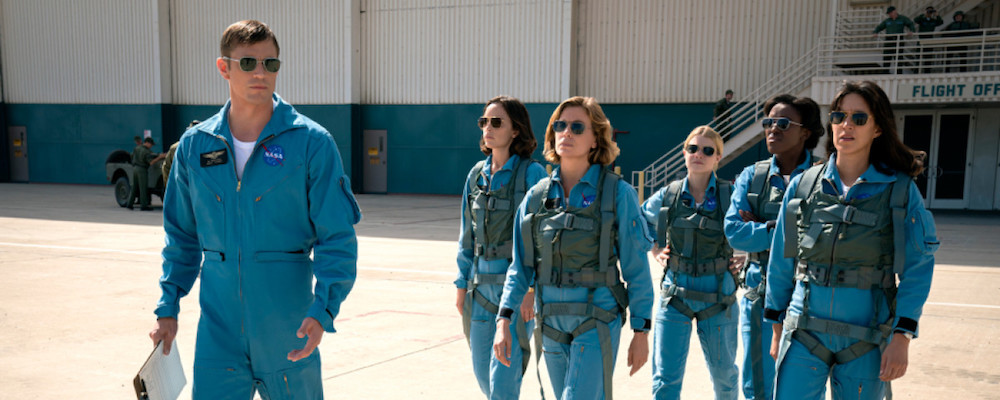In Apple TV Plus Series ‘For All Mankind,’ the Soviets Get to the Moon First
Alci Rengifo
Imagine if the Soviets had gotten there first and we had to play catch up. That’s what Ronald D. Moore‘s intriguing Apple TV Plus series “For All Mankind” ponders when it comes to the space race. It’s a rare alternate history that doesn’t focus on whether another country won World War II, or what if a certain political figure had never been assassinated. Instead it goes to great lengths to imagine how different the world might have developed if the USSR put a man on the Moon before the United States. This is its key premise, yet at its core it’s also about American hubris. Imagine if we weren’t always seen as or felt like number one.
It’s that fateful night in 1969 and the world sits watching as mankind prepares to land on the Moon. Yet this is not the same footage we have all seen countless times. Instead, a Soviet cosmonaut takes that historic first step, declares it in the name of Marxism-Leninism and plants the hammer and sickle on the lunar surface. The effect is shattering for the U.S. where astronaut Ed Baldwin (Joel Kinnaman) sadly watches with his friends and fellow pilots. Baldwin had been slated to take that first step himself as part of the Apollo 10 mission which was called off at the last minute. His wife Karen (Shantel VanSanten) stands by his side. As the Nixon White House gets more restless over the situation, over at NASA officials like Deke Slayton (Chris Bauer) and Margo (Wrenn Schmidt) rush to get the space program back on track. When Apollo 11 makes a successful Moon landing for the Americans, the race with the Soviet Union intensifies.
The fun of “For All Mankind,” particularly in its initial episodes, is how it’s a genuine period piece where the history gets scrambled. It opens in classic pseudo-documentary fashion with John F. Kennedy’s classic speeches touting his challenge to go to the Moon before the decade of the ‘60s is over. The first scenes with everyone gathering around bars and living rooms to watch the moon landing could be out of any classic piece of American nostalgia, and then the man in the spacesuit starts talking in Russian and reality is turned upside down. Creators Matt Wolpert, Ben Nedivi and Ronald D. Moore, who is a veteran of various “Star Trek” shows and movies, are so determined to make this world feel authentic that it rarely travels into space itself. The real drama is here on earth as Baldwin grapples with his failures, and later in the season when he does make it into space he and Karen face more family-oriented emergencies he is powerless to deal with. Even sexual politics take center stage as pioneers like Danielle Pool (Krys Marshall), NASA’s first black woman astronaut and Molly Cobb (Sonya Walger) face sexism at NASA, it is still 50 years ago to be sure. In-between storylines involving these characters we get invented recordings of the infamous Nixon tapes, as the paranoid president rants about the space race being lost and Ted Kennedy possibly using this fact to win the White House.
“For All Mankind” combines broader alternate history with the more intimate, domestic dramas. The Soviets start building bases on the Moon, which means we have to as well. In this show the USSR keep getting ahead. The writing has fun throwing around real life figures from NASA history, like German rocket scientist Wenher Von Braun (Colm Feore), who keeps having to explain to the press and his superiors the science behind fuel shortages, distance calculations and other important factors when pondering a Moon trip and mission control director Gene Kranz (Eric Ladin). Famous astronauts also make appearances like Buzz Aldrin (Chris Agos), Neil Armstrong (Jeff Branson) and others. But now instead of being instant icons, they are astronauts on the losing side.
Science fans need not expect just a mere drama. Midway through the season “For All Mankind” picks up with the heavy science references, theories for working on the Moon and details about how one gets a radio signal from Earth up there. There’s more of a thriller vibe near the end of the season as well as astronauts get stuck in space and NASA has to figure out how to bring them back. But it’s the human touch that makes the series intriguing. Everything about losing the space race affects the characters psychologically, and in a sense they represent how the U.S. character would shift if we suddenly began losing to our adversaries. On the flip side there’s also a message in this show on how the Cold War did inspire much innovation because of its fierce competition between superpowers and ideologies.
“For All Mankind” turns the tables on America in a thoughtful, at times highly fascinating way. It’s not a dramatization of history but a reinvention of it. The science is almost an afterthought, what it does instead is remind us that you can’t always win the race, or we should at least consider the possibility of losing.
“For All Mankind” season one premieres Nov. 1 with new episodes streaming every Friday on Apple TV Plus.

